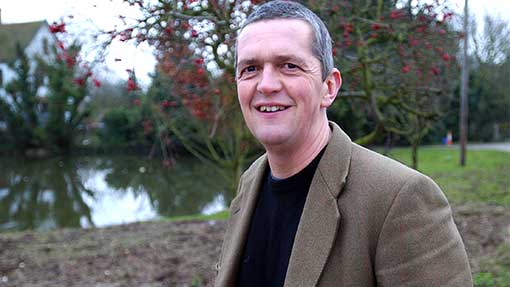OPINION: Poetry won’t help as flood waters rise

Like many households, the Smith abode gets run on a gender divide of pink jobs and blue jobs.
For example, Mrs Smith tends to do most of the cooking and Mr Smith is in charge of the drains. That’s where the trouble starts. Mrs Smith feels the drains aren’t cleaned regularly enough and Mr Smith feels if less “gubbins” (as he calls it) was tipped down the sink the drains would need less cleaning. This usually leads to a bit of a stand-off while fetid water hangs around in the kitchen sink until Mr Smith gets the drain rods out to clear the gubbins out of the system. But recently I’ve tried a new argument I learned from the Environment Agency. I explained to Mrs Smith that the build-up of fetid water in her sink wasn’t really due to the gubbins in the drains but rather it was due to her turning the taps on so often. I also suggested that rather than ask me to clean the drains out, it would be better to try to keep all the fetid water in pots and pans around the draining board. This led to aforesaid pots and pans being thrown at me while I was trying to read the paper.
When it comes to draining excess water away from villages and farmland, I will confess I’m no engineer, but here’s the thing – nor are some of the people in the Environment Agency. Take Lord Smith of Finsbury, chairman of the Environment Agency. He studied English at University and did his PhD in the poetry of Coleridge and Wordsworth. Now call me old-fashioned, but when I’ve got a problem with a ditch, I tend to call in a bloke with a digger rather than ask someone to write a couple of stanzas in praise of the ditch.
But obviously the chairman isn’t the be-and-end-all – the chief executive is equally important. To his credit, Paul Leinster is an environmental engineer, but the person he took over from, Barbara Young, was not. Barbara Young was CEO at the EA for the eight years, from 2000-2008, and before that she was CEO of the RSPB. The phrase “who put the fox in charge of the chicken coop” comes to mind, as does the observation “you can take the bird out of the RSPB, but you can’t take the RSPB out of the bird”.
The fact the EA stopped routinely dredging rivers such as the Parrett and the Tone around the time of the millennium has to be noted. The other thing that should be noted is that both Lord Smith and Barbara Young had close connections with the Labour Party, which was in power at the time of their appointments.
But enough of the past. To be fair to the RSPB, it is a much-improved organisation. It now acknowledges we must return to dredging rivers such as the Parrett and the Tone. It even sees the sense in having good sea walls for flood protection now that the sea has punched holes in the walls that protect various bird reserves on the East Anglian coast. This is quite a contrast to its old policy of deliberately punching holes in sea walls such as the one that used to protect Wallasea Island in Essex.
If there was one thing I would like to see come out of the flooding crises of 2013-14, it would be a return to a proper regard for engineers and engineering. Let’s put the political rhubarb behind us and get ourselves properly defended from flooding.
Guy Smith comes from a mixed family farm on the north-east Essex coast. The farm is officially recognised as the driest spot in the British Isles. Situated on the coast close to Clacton-on-Sea, the business is well diversified with a golf course, shop, fishing lakes and airstrip.
